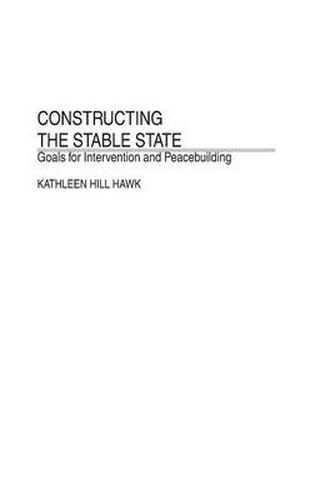Readings Newsletter
Become a Readings Member to make your shopping experience even easier.
Sign in or sign up for free!
You’re not far away from qualifying for FREE standard shipping within Australia
You’ve qualified for FREE standard shipping within Australia
The cart is loading…






Examines what external actors can do to help move a war-torn society in conflict toward a stable peace. The United States and the international community intervened in a number of internal conflicts throughout the 1990s, generally justifying their actions on humanitarian grounds. In most cases, the external military intervention largely halted the fighting and allowed humanitarian assistance to be distributed. However, as Hawk makes clear, simply halting the fighting has not allowed these countries to create stable governments and harmonious societies. This study is based on the premise that if external actors–foreign governments, international organizations, and private groups–can not figure out how to lay a foundation for a stable, longer-term peace, there will be decreasing support for international intervention and peacekeeping/peacebuilding missions in the future. Although external actors have undertaken many activities in the aftermath of a military intervention in an attempt to consolidate peace, sufficient attention has not been paid to (re)constructing the state as a capable, effective, and legitimate entity. While (re)constructing the state is only a portion of what needs to be done to bring about a stable, long-term peace, it provides a necessary foundation upon which to structure the other activities. Through her examination of external actions in Somalia, Bosnia, and Kosovo, Hawk draws 23 lessons, nine of which are applicable to interventions in general and the remaining 14 specific to statebuilding efforts. This study will be of particular interest to scholars, students, and policymakers involved with conflict resolution and international relations.
$9.00 standard shipping within Australia
FREE standard shipping within Australia for orders over $100.00
Express & International shipping calculated at checkout
Stock availability can be subject to change without notice. We recommend calling the shop or contacting our online team to check availability of low stock items. Please see our Shopping Online page for more details.
Examines what external actors can do to help move a war-torn society in conflict toward a stable peace. The United States and the international community intervened in a number of internal conflicts throughout the 1990s, generally justifying their actions on humanitarian grounds. In most cases, the external military intervention largely halted the fighting and allowed humanitarian assistance to be distributed. However, as Hawk makes clear, simply halting the fighting has not allowed these countries to create stable governments and harmonious societies. This study is based on the premise that if external actors–foreign governments, international organizations, and private groups–can not figure out how to lay a foundation for a stable, longer-term peace, there will be decreasing support for international intervention and peacekeeping/peacebuilding missions in the future. Although external actors have undertaken many activities in the aftermath of a military intervention in an attempt to consolidate peace, sufficient attention has not been paid to (re)constructing the state as a capable, effective, and legitimate entity. While (re)constructing the state is only a portion of what needs to be done to bring about a stable, long-term peace, it provides a necessary foundation upon which to structure the other activities. Through her examination of external actions in Somalia, Bosnia, and Kosovo, Hawk draws 23 lessons, nine of which are applicable to interventions in general and the remaining 14 specific to statebuilding efforts. This study will be of particular interest to scholars, students, and policymakers involved with conflict resolution and international relations.